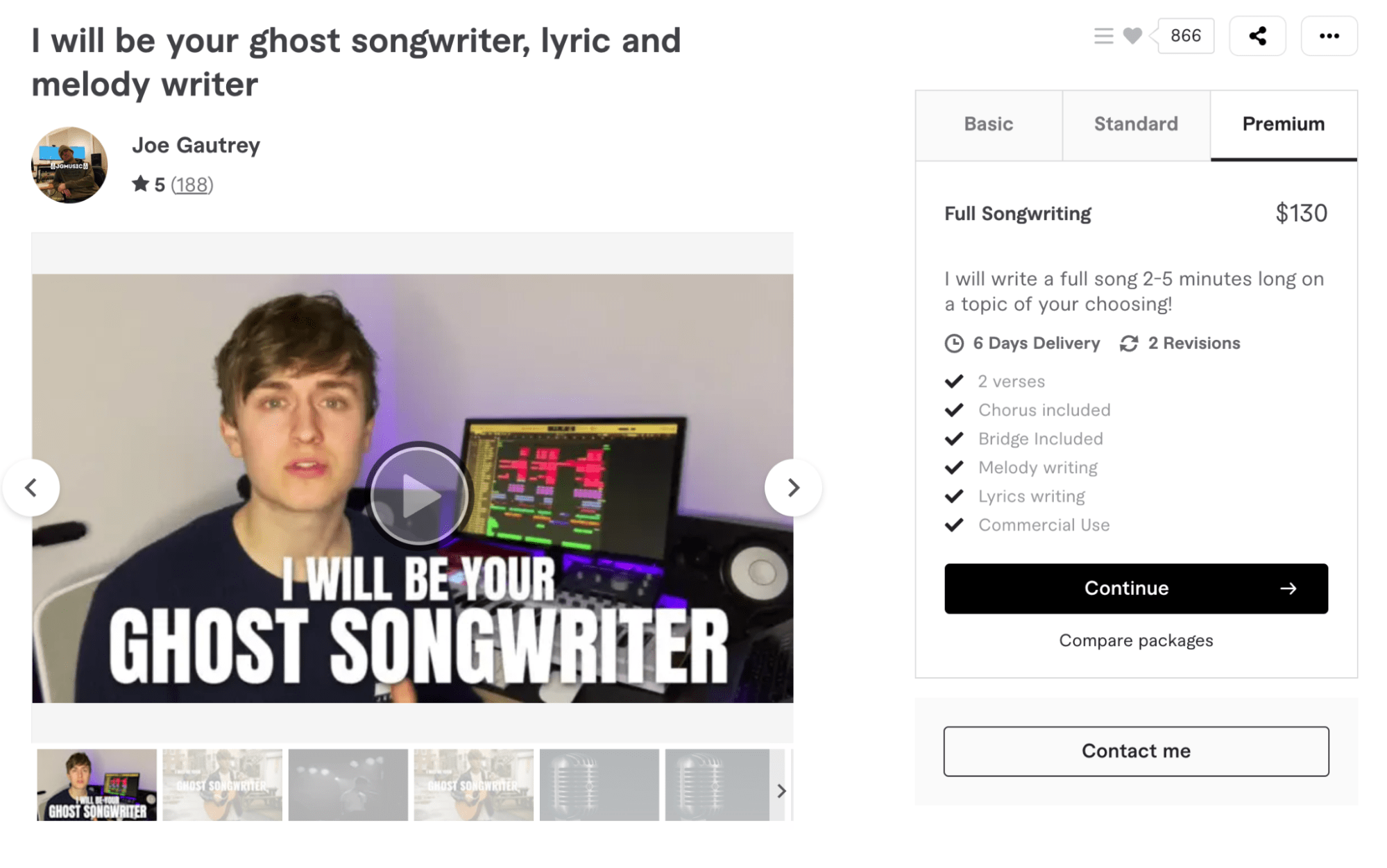What Is a Ghostwriter? How To Hire One in 2024
Learn exactly what a ghostwriter does, why authors use ghostwriters, and where to find the best ones in this guide.
 April 10, 2024
April 10, 2024 15 minute reading
15 minute reading
A ghostwriter is someone hired to write books, speeches, and other texts, that are credited to another person. Ghostwriters are more common than you think.
The bestseller Nancy Drew? Ghostwritten. The mildly intriguing fiction ebook on Amazon? Ghostwritten. Your President’s latest speech, definitely ghostwritten.
The point is: Ghostwriters are everywhere, and they have excellent skill sets for producing quality work for many types of content.
Whether you’re looking to get a ghostwriting job, or find a ghostwriter for your own work, this guide will give you a basic overview of how it works.
Lass dir von einem Ghostwriter beim Schreiben unter die Arme greifen.
What is a ghostwriter?
A ghostwriter is a writer who produces content but does not receive credit or byline for their work. A good ghostwriter writes in the client’s voice for a gig. They produce the work, go through a round of revisions or two, and then the content is published in the author’s name. Ghostwriters can be paid at a flat fee or hourly rate.
Generally, it's a professional relationship between two parties:
The Author: The person (or company) that hires the ghostwriter to write content for an agreed fee. The author takes full credit for the work that the ghostwriter produces.
The Ghostwriter: The writer hired and paid by the "author" to ghostwrite content, accepting that they will not receive credit for the ghostwriting work.
A contract between the author and writer usually involves a confidentiality clause, so the ghostwriter remains anonymous.
What's the difference between a ghostwriter and a co-author?
A co-author is a writer who works with you to produce a book by collaborating with joint ideas and vision. It's a combined effort, and the co-author is an author. For instance, imagine you co-found a business with a partner and want to write a book together. You and your co-founder work on the book and are both authors and co-authors. A ghostwriter is not an author or co-author.
What exactly does a ghostwriter do?
A writer is hired to ghostwrite non-fiction or fictional books, journalistic or literary works, blogs, podcast or video scripts, ebooks, song lyrics, etc. Celebrities often hire high-quality ghostwriters to write their memoirs, and political leaders may also make use of ghostwriters for written material, including speeches, news stories, and magazine articles.
Some authors work collaboratively with a ghostwriter. Others provide the material and leave the ghostwriter to their craft. Screenplay authors may hire a ghostwriter to improve the quality of a script by editing or rewriting the material.
Ghosting is not uncommon in the world of popular music. Many songwriters create songs and musical pieces as ghosts, and write lyrics to suit the style of the musician.

Joe Gautrey is a popular ghost songwriter on Fiverr.
Why do authors use ghostwriters?
You’re probably thinking why authors, if they are passing off as professional writers with their own book, work with ghostwriters.
Some authors, particularly those who are very busy professionals, celebrities, or public figures, may not have the time to write. A ghostwriter can help them produce a book or article more efficiently. Some authors find that working with a ghostwriter enhances the creative process.
For those looking to get their work published quickly, such as to capitalize on a trending topic or to meet a specific deadline, ghostwriters can expedite the writing process because they are professional writers who can dedicate focused time to the project.
Is ghostwriting illegal?
Ghostwriting is legal, but with two defining factors that can influence the legality:
Contracts
Historical precedent
An author and a ghostwriter are bound by contract law when they agree to work together. In a formal opinion, the American Bar Association (ABA) outlined in 2007 deemed that ghostwriting must meet the "Model Rules of Professional Conduct / Professional Responsibility." What that means is that legal services must have proper disclosure. The New York County Law Association later published an opinion paper in 2010, agreeing with the ABA.
Ghostwriting is legal if both parties agree with, and abide by, the terms of the contract:
Compensation: It doesn't necessarily have to be money. It could be an exchange of services or goods. That said, in most cases, payment is monetary.
Plagiarism protection: The ghostwriter must produce original, plagiarism-free work.
Intellectual property rights: By the contract terms, the ghostwriter hands over all rights to the work they produce, and it will likely involve an NDA (non-disclosure agreement).
Penalties for violation of the contract: Agreed penalties if either party violates the terms of the contract.
Termination agreements: Predetermined rules to anticipate the event of one of the parties wanting to terminate the contract.
The writer owns the content copyright, but when you buy the content, you purchase the intellectual property rights to the ghostwritten content to do as you want. You can legally edit, rewrite, publish, etc.
How much do you pay for a ghostwriter?
The role of a ghostwriter can be lucrative, with some professional, highly experienced ghostwriters charging fees of $10,000 to $25,000+ for a non-fiction or fictional book. To ghost at that financial level, ghostwriters are expected to produce top-quality work and complete the project within 3-6 months.
Most professional ghostwriters request a 50% upfront fee before starting work, and some ghostwriters may accept a contract with a lower fee in return for royalties. This agreement may occur if the accredited author is a celebrity or well-known public figure.
If the anticipated book sales and profits could potentially be high, a ghostwriter may ask for 10-20% royalties on the total gross profits. The accredited author may cap the total amount the ghostwriter can earn, but it can still be a lucrative agreement.

Amy Hood is a pro ghostwriter on Fiverr who’s prices start a $195 for a 750 word story.
Having a career as a ghostwriter
The primary skill required to become a ghostwriter is proven experience as a professional writer. You increase the odds of being hired as a ghost if you have a portfolio of writing work to present to potential clients.
There are writing courses available, but if you've worked as a freelance writer for a period, you will succeed if you know how to communicate with clients professionally and organize your workflow for a ghostwriting project.
You can offer ghostwriting services for many different projects:
LinkedIn posts
Nonfiction books
Business books
Content creation
Speechwriting
Fiction writing
How to hire a ghostwriter
Finding the right ghostwriter may not be easy. Take your time, research, and qualify the best ghostwriter for the job. For instance, research marketplaces such as Fiverr, where all levels of ghostwriters are available that may be suitable for your project.

The Ghostwriting category page on Fiverr
Know where to look for a ghostwriter: Review a marketplace like Fiverr and select three or four choices. Check their listed projects and reviews to assess their suitability for your ghostwriting project. After that, contact your top two picks and start a dialogue. That lets you and the ghostwriter ascertain that you are a good fit.
Assess the ghostwriter's experience: Professional ghostwriters know how to craft their writing, possess storytelling skills, and the ability to capture an author's tone of voice. A ghostwriter with a traditional publishing record is sought-after and likely more expensive to hire, although, in the long run, it could be the preferred option for best results.
Check the ghostwriter's portfolio: How much work have they produced, and how long have they worked as a ghostwriter? For instance, if you're hiring a ghost for web copy, you don't need a writer with in-depth experience.
Can the ghostwriter capture your style and voice? If the writer has a portfolio, you can figure out the answer. If not, ask for a paid writing sample. Most professional ghostwriters are like chameleons and can adapt to various writing styles.
Be clear about your requirements: Will you be deeply involved in the project or adopt a hands-off approach. Are you open to suggestions from the ghostwriter, or will you drive the direction of the content? Some ghostwriters prefer autonomy, and others enjoy in-depth guidelines.
Discuss the minutia: A collaborative approach works best with open communication between author and ghostwriter. Will you work chapter-by-chapter or check the work after a time? Clarify that the ghostwriter's process aligns with your style. If you prefer to micromanage and the ghostwriter prefers a freestyle approach, there could be conflicts along the line.
Be prepared to pay for the best: Skilled ghostwriters are more expensive but may save you money or make you money.
Ghostwriting examples
There are numerous outlets and opportunities for ghostwriters, and you may prefer to become a specialist in a chosen area.
Non-fiction ghostwriting
Non-fiction ghostwriting is in demand. Public figures and celebrities often hire a ghostwriter to write their autobiography.
The author may provide material for the ghostwriter to sort, edit and rewrite. Alternatively, the ghostwriter may have to start from scratch. In that instance, collaboration is imperative. If the credited author has existing material like podcasts, social media channels, or blogs, the ghostwriter can tap into the existing voice, transcribe, and start crafting the content.
Other celebrity projects could include "how-to" books, fitness or diet guides, and cookbooks. Publishers can capitalize on such projects knowing loyal fans will buy the finished book.
An independent consultant or coach may also hire a ghostwriter to write a book in their chosen niche to enhance their credibility as an expert. These books are often self-published and used as a giveaway or sales tool.
Fiction
Publishers may hire a ghostwriter to write books for a well-known, famous author to increase the number of books published to a waiting audience. Notably, ghostwriters often write mysteries, detective novels, and teen fiction. The work can also include writing for pen-named authors who use a pseudonym.
Unlike non-fiction ghostwriters, writers may be specialists in fiction writing. The ghostwriter must immerse themselves in previous publications so they can format the book in the same style and tone as the author.
When a publisher hires a fiction ghostwriter, they look for a writer with experience writing fiction, especially in the same genre. Alternatively, verifiable proof of writing a successful book will catch the publisher's attention.
Religious ghostwriting
Ghostwriters wrote several papal encyclicals. For instance, Joseph Lemius (1860 -1923), the procurator in Rome of the Oblates of Mary Immaculate, wrote Pascendi.
Religious ghostwriting may not be as popular as it was in the 1800s and early 1930s, but if it appeals to you as a writer, you could pursue it as a specialism.
Academic ghostwriting
Earlier, we discussed the ethics of academic ghostwriting. Whilst it isn't illegal in many countries, it is academically dishonest and unethical. The practice could constitute academic fraud.
There are ghostwriting freelancers and companies openly selling thesis, dissertations, term papers, and entrance essays to students. Universities reserve the right to test students with an oral exam if they suspect the student submitted ghostwritten papers. If found guilty, the student faces a serious charge of academic fraud and could lose their place at the university.
Medical ghostwriting
Pharmaceutical companies hire ghostwriters to write papers. When complete, the companies pay a physician or scientist to endorse the paper before they publish it in a scientific or medical journal. The practice is generally frowned on, although not, at this point, illegal.
The European Medical Writers Association published guidelines for professional medical writers to ensure that ghostwriters adhere to ethical writing standards. In addition, the World Association of Medical Editors acknowledges professional medical writers' work as legitimate.
Website content
Many businesses hire freelance ghostwriters to produce content for the company website. Some may employ in-house writers and editors but may still hire the occasional freelancer if the workload increases. As it's a time-consuming job, hiring a ghostwriter is the most effective way to continue building business content and developing a brand.
Music ghostwriter
Mozart was hired as a music ghostwriter to write music for affluent clients who wanted to "show off" their skills as gifted composers. The film and television industry often hires ghostwriters to write music and lyrics. The music ghostwriter receives payment for their contribution, but the "composers" listed on television cue sheets receive royalties every time an episode broadcasts.
Ghostwriters also get involved in the popular music industry, often to help inexperienced songwriters and singers. They can assist with overcoming writer's block and maybe even help to create a number one hit. Their name may or may not be listed in the album credits.
Work with a ghostwriter today
Hiring a ghostwriter could be the best decision you ever make. For instance, many people say they want to write a book, but they don't do it. Structuring a book is challenging. It can be tricky to stay on top of the work and produce coherent writing in a readable format.
Whether you have an incredible autobiography to share, a series of social media posts to create, or want to learn valuable writing skills, a ghostwriter can make your dream a reality.
Check out Fiverr today and hire a ghostwriter to fulfill your goal of becoming a published author.



